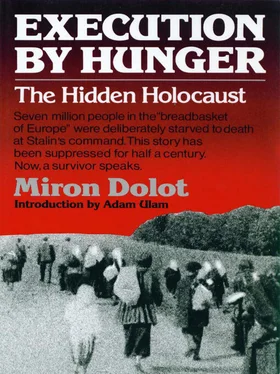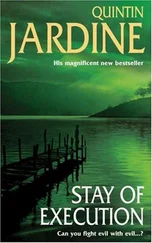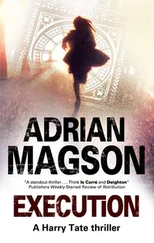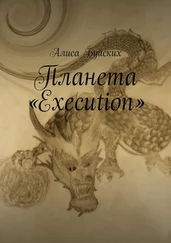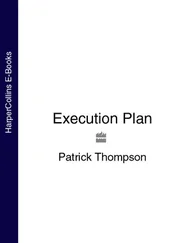The chairman of the commission, Comrade Khizhniak, meanwhile stood aside, calmly watching the struggle. As the advantage seemed to be on the side of the old man, he lost his patience and temper and elbowed his way to the victim. Then, with the air of practiced experience, he shoved aside the man grappling with Aleka’s right leg and jumped on the old man’s abdomen with all his weight. Then he kicked his heavy boots into his chin several times. As our relative lost consciousness, Comrade Khizhniak calmly returned to his former position.
The rest of their “business” was done quickly. The boots were removed, and the triumphant officials had found their booty—a few rolls of money wrapped around the unconscious man’s ankles. The commission then left. When they were out of sight, Mother and I went to Aleka’s aid. He regained consciousness, but he didn’t live for long: by evening when we returned, he had died. He was lying in the same place and in the same position as we had left him; there was no one with him. The look of suffering and helplessness on Aleka’s face still haunts me.
The morning gray of the east had now spread all over the sky with its warning of snowstorm. It was already light outside, and we still had to go to the homes of my other uncles.
By the time we arrived at Uncle Yakiv’s house we were again too late. A guard stood in front of the house. Our uncle’s entire family was in the center of the village, the guardsman informed us.
Our Uncle Havrylo’s house was in the middle of the village, a few hundred yards from the village government. A guard who stood at his gate told us that we should look for our uncle in the village square. We were again barred from entering the backyard, but we noticed that office furniture was being moved into the building. We were later told that the chairman and the secretary of the village soviet had begun moving into my uncle’s house the moment he and his family were arrested.
As we approached the village square, two GPU men barred our way. They ordered us back from where we had come. Mother’s pleas to be allowed to look for her son were in vain. Their duty was to keep everyone from the square. But as the soldiers continued their rounds, Mother and I slipped to the side and ran through gardens and orchards toward the square. Soon we reached a fence from which we could see everything that was happening.
It was a sad picture. All the county and local officials who had attended the meeting the day before were gathered around the platform. The county Party commissar sat behind a table covered with bright red cloth, speaking into a specially installed telephone. Flanking him were Thousander Zeitlin and Comrade Pashchenko, the new chairman of the village soviet. On the platform stood GPU and MTS Commissars, facing the square.
Several hundred farmers, women, and children, were milling around in small groups. Screams and laments rose from the crowd; children cried; men loudly protested; the sick and weak ones groaned and called for help.
But no one listened to them, and there was no way out. The square was carefully guarded. Closer examination showed us that it was surrounded by GPU soldiers.
All the arrested villagers were divided into small groups, each assigned to certain spots. Special gunmen, chosen from among komnezam and Komsomol members, watched the groups dutifully.
The military truck that had brought the GPU soldiers stood at a considerable distance from the crowd. Horses were hitched to the sleighs and were ready to be set in motion at any moment.
We quickly sighted our relatives; the three families were gathered together. All of them were standing except for old Uncle Havrylo, who sat on the snow. His wife was sobbing beside him.
A cold wind blew snow on the unfortunates, who were not properly dressed, for they had not been allowed to take warm clothing with them. We wanted to help somehow, and since we could assume that they would be banished to Siberia, we had to get them some heavy clothing.
As I was about to leave for home to gather these things, the noise in the square began to grow louder. The ones who had been sitting stood erect, and the protesting ones raised their voices. The various small groups combined in a spontaneous reaction.
The crowd converged on a line of officials. The guardsmen in front of the officials opened fire once or twice, but the line broke, and the officials disappeared in the mass. Another moment and the square would have been empty. Then, at someone’s signal, a machine gun opened fire. Bullets crisscrossed over and through the square. Vykonavtsi and GPU soldiers fired their shotguns and rifles; the screams, shouts, and protests mingled with the bursts of firearms.
The crowd gave way, and order was restored. A few dead lay scattered in the square. We learned later that three villagers died there.
After a while, we saw the cause of the outburst. Under careful supervision of soldiers, a score of sleighs moved into the square. They were to take the arrested farmers out of the village. Loading of six to eight persons to a sleigh started immediately, controlled through the use of a list. Kinship, age, sex, and health were not taken into consideration. As a result, husbands were separated from their wives, and children from their parents. The old and sick had to share sleighs with strangers.
As one sleigh moved to join a column, a young man sprang from it and raced toward another sleigh in which his helpless and weeping wife and children were riding. The father obviously wanted to be with his family, but he did not reach them. Comrade Pashchenko, the chairman of the village soviet who was supervising the whole action, raised his revolver and calmly fired. The young father dropped dead into the snow, and the sleigh carrying his widow and orphans moved on.
The loading took about half an hour. Some fifty sleighs lined up one after another, with the leading one pointed toward the district seat. Military wagons armed with the machine guns were placed at the front, in the middle, and at the end of the sleigh train. One civilian gunman was assigned to every two or three sleighs. Some militiamen and GPU men followed the train on horseback.
The commissars and the village officials happily chatted among themselves as this parade passed the speakers’ platform. The dead still lay in the road, frightening the horses.
As soon as the last wagon left the square, we went to the Village Soviet hoping to find Serhiy, but we could not see him. We were only told that his case would soon come up for trial in the kolhosp court. [13] Kolhosp court was one of the irregular courts set up in Ukrainian villages during the collectivization. At first they acted as comradely courts, and their jurisdiction never exceeded petty offenses. The kolhosp court was supervised by the village soviet. But during the peak of collectivization, the kolhosp courts acted as regular courts of law with the reservation that cases of political nature, or serious crimes, were referred to higher courts of law or to the security organs. Often, if not all the time, the entire kolhosp court proceeding was conducted by the secretary of the village Party organization.
The news of the fate of my uncles and their fellow prisoners returned with the empty sleighs. A freight train had been waiting for them at the railroad station. There they were herded into the box cars. We did not learn what happened to them after that until much later.
AFEW DAYS after the arrest of Serhiy, Mother was summoned to appear before the kolhosp court as a witness. The official summons stated that the trial was to take place the following Sunday, at the very beginning of March, and that the name of the defendant was Serhiy.
Читать дальше
